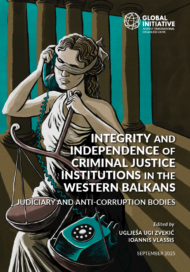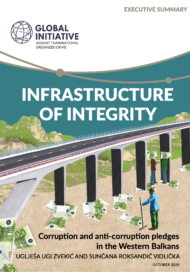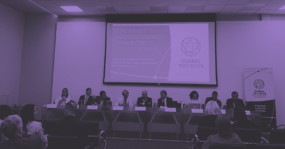Event Details
Where
Online - Zoom Webinar
Posted on 11 Sep 2025
The credibility of democratic institutions in the Western Balkans rests on the independence of the judiciary and the effectiveness of anti-corruption bodies. This report provides an in-depth assessment of these institutions, documenting the progress of reforms and the challenges that continue to undermine trust.
Across the Western Balkans, concerns persist regarding the politicisation of judicial systems and the vulnerability of anti-corruption institutions to undue influence. Although all jurisdictions have established legal frameworks designed to ensure independence, their implementation often falls short. In practice, weak safeguards, inconsistent application of disciplinary procedures, and blurred lines of accountability continue to affect credibility.
The report highlights how judicial councils, designed to serve as guarantees of independence, face criticism for opaque decision-making and susceptibility to political pressure. Appointment and promotion processes frequently lack transparency, with merit-based criteria not always being respected. These shortcomings affect both the integrity and the perception of judicial systems.
Anti-corruption bodies have been established with mandates to investigate, prevent, and prosecute corruption. While they have created opportunities for more structured responses to systemic corruption, their independence is often constrained by political interference, insufficient resources, and weak cooperation with other institutions. As a result, their capacity to carry out mandates effectively and to deliver meaningful outcomes remains limited.
International standards, including those of the Council of Europe and the European Union, provide benchmarks for reform. Progress towards meeting these standards varies across the region. While some jurisdictions have undertaken comprehensive judicial reforms and introduced anti-corruption courts or agencies, others lag behind, struggling with politicisation and lack of accountability.
The findings underline the importance of strengthening transparency in appointments, ensuring accountability through effective oversight, and safeguarding independence from political influence. For anti-corruption bodies, long-term sustainability depends on adequate resources, professional integrity, and protection from interference.
Public trust in the justice system and anti-corruption structures is critical for democratic consolidation in the Western Balkans. Citizens must see these institutions not only as legally independent, but also as functionally impartial and effective in practice.
Gender representation also shapes the credibility of these institutions. While women are well represented in many judicial systems across the Western Balkans, appropriate representation remain scarce in senior decision-making roles, and anti-corruption bodies often lack gender balance or disaggregated data. This imbalance reflects systemic barriers that weaken both fairness and effectiveness; greater gender parity would not only advance equality but also strengthen institutional integrity and public trust.
By documenting both achievements and shortcomings, this report provides evidence-based insights into the state of judicial independence and anti-corruption bodies in the Western Balkans. The analysis serves as a resource for policymakers, civil society, and international partners committed to advancing rule of law and democratic governance in the region.




